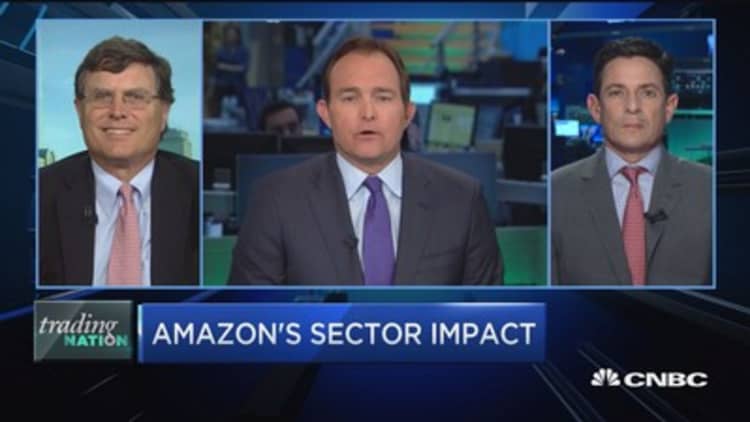
Often thought of as a tech stock, Amazon is actually in the 's consumer discretionary sector. And those who invest in products tracking that sector, like the popular XLY ETF, are the richer for it.
Amazon is easily the largest component in the consumer discretionary sector, with a weighting of about 15 percent. Since the overall consumer discretionary sector accounts for 12.2 percent of the entire S&P 500, making it the fourth largest out of the 11 sectors, Amazon makes up about 1.8 percent of the large-cap index.
Amazon is thus the third most important stock within the S&P 500, behind Apple and Alphabet (so long as we include the values of Alphabet's two types of shares).
The retail giant's weighting in the market-cap-weighted index has grown along with its share price. Amazon shares have risen by 32 percent this year, with the latest boost coming Friday, when the stock rose 2.4 percent following the announcement that the company has agreed to buy Whole Foods.
How has the stock's performance impacted that of the consumer discretionary sector, and of the Consumer Discretionary Select SPDR Fund (XLY)?
According to Howard Silverblatt, senior index strategist at S&P Dow Jones Indices, Amazon has contributed about a quarter of the sector's performance this year. That means that if the stock were not in the sector, then the set of stocks would have risen by a bit more than 8 percent, rather than its actual nearly 11 percent rise.
On the other hand, while Amazon's contribution is measurable, the extent to which its success has harmed the businesses of other stocks in the sector is hard to know. Indeed, the sector's multiline retail group has fallen by 19 percent this year, dragged down by Macy's, Target and Kohl's.
And despite Amazon's large contribution, some investors might actually like the sector more if it were not a part of it.
"I would continue to overweight the sector," Chad Morganlander of Washington Crossing Advisors wrote to CNBC on Friday. "We believe consumption will be strong in 2017 & 2018. And valuations [for the sector] make sense when you take AMZN out of the equation."






